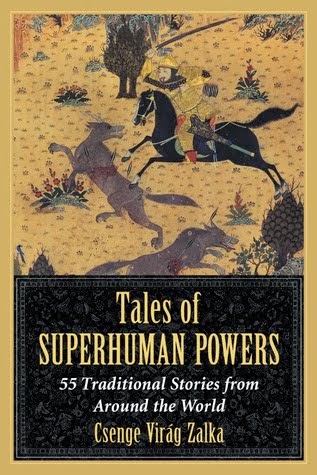I have read a lot of folktale collections from India, so this was a rare case where I had too many things to choose from. I decided to pick up a book from my TBR list, one that had the most intriguing title...
Shikhandi
And Other Tales They Don't Tell You
Devdutt Pattanaik
Zubaan Books, 2015.
This book contains 30 stories from the myth and folktale traditions of India. I have read other books by the author before, and he always does a lot of background research, unearthing fascinating stories. This was true in this case as well. The concept of the book is that it collects tales and myths that reflect the gender diversity and queer elements of the traditions of India, from a third gender (hijra), through same-sex relationships all the way to sex change. These "queer" tales have been a part of the traditions of India for thousands of years, but they rarely ever show up in books aimed at a western audience.
The book is a fascinating read. Each story comes with an abundance of notes and comments on its sources, cultural/historical/literary background, similar stories, and significance in contemporary society. There is a detailed introduction about Hindu mythology and the definitions of queerness, and a bibliography at the end. The stories are accompanied by lively black-and-white illustrations.
Highlights
Honestly, I could highlight all 30 stories, but I'll try to pick some of the most interesting ones:
There was a lovely story about a young woman in labor, whose mother could not get to her in time, so Shiva took on the appearance of the mother and acted as a midwife for the birth. I was amused by the tale of Chudala, the wise woman who could not get her husband to listen to her teachings... so she turned into a man, and the husband was suddenly listening with rapt attention. From then on, she taught him as a man during the day, and slept with him as a woman at night, until she finally revealed the truth, and he had to admit that he had been wrong. I was also amused by the story of Samavan, where two poor friends were trying to win gifts from a queen, who only gave them to married couples - so one of the lads disguised himself as a woman. The queen's prayers unexpectedly turned him into one... but she didn't mind, she married her friend, and they lived on happily as a couple.
Many of the stories were from, or connected to, the great epics of India, the Ramayana and the Mahabharata. For example, the book includes the famous story where a prince tries to take advantage of Draupadi, the wife of the five Pandava brothers - but when he approaches her bed, he finds Bhima, the strongest husband, dressed in Draupadi's clothes under the covers.
In the story of Ila a prince wandered into an enchanted forest and turned into a woman. She begged Shiva to change the spell (it couldn't be broken), so she ended up being a woman under the waning moon, and a man under the waxing moon. Anxious that no person would want to marry them, they encountered Boodh, the god of Mercury, who is neither man nor woman (or both, depending on the story), and they lived happily together.The story of King Kopperumcholan was beautiful too. A poet and a king had a deep connection without every meeting each other; the king loved the poet's works, and the poet loved the king's wisdom. When the king was about to die, he ordered an empty tomb to be built next to his own - because he knew his poet friend would come to be buried beside him. Another beautiful story was from the hijra tradition about the Ramayana. When Rama went into exile, he told his people trying to follow him "Men and women of Ayodhaya! Go home!" When he returned 14 years later, he found the hijras still patiently waiting... because they had not been told what to do. Touched, Rama promised them they would not be invisible in his kingdom.
The book also contains an old favorite of mine, the myth of Bharigath, son of two mothers, born from the love of two queens, who grows up to be a great king who brings the river Ganges to Earth.
Connections
The hero of the title story, Shikhandi, also comes from the Mahabharatha. Born female, he is raised as a prince. When he gets married, a yaksha loans him his genitals for the wedding night... then decides the prince can keep them. This transition is later turned into an advantage against the enemy on the great battlefield of the epic, when Bhisma, the enemy's hero refuses to fight the prince saying he is "a woman". This is how Bhisma is defeated, bringing vengeance from Shikandi who had been dishonored by him in a previous life. Genitals borrowed and princesses turned into princes is a common motif in world folklore; it appears in Ovid's Metamorphoses, and even in folktales such as ATU 514.
The tale of Madhata's birth began with a king drinking magic water meant for his wives, and getting pregnant from it. This motif also exists elsewhere; last time I read a similar story from Armenia. The myth of Bhangashvana was similar to the Greek story of Tiresias, centered on the question of whether men or women enjoy sex more. The answer was "women" here as well, and it was especially interesting that this question was posed to a hero on his death bed, as the most important thing he needed to answer...
I was reminded of Scottish and Irish tales by the story of Naranda, who bathed in a lake, turned into a woman, and then lived as a wife and mother until she lost her family and went back to the lake.
Where to next?
Sri Lanka!










No comments:
Post a Comment